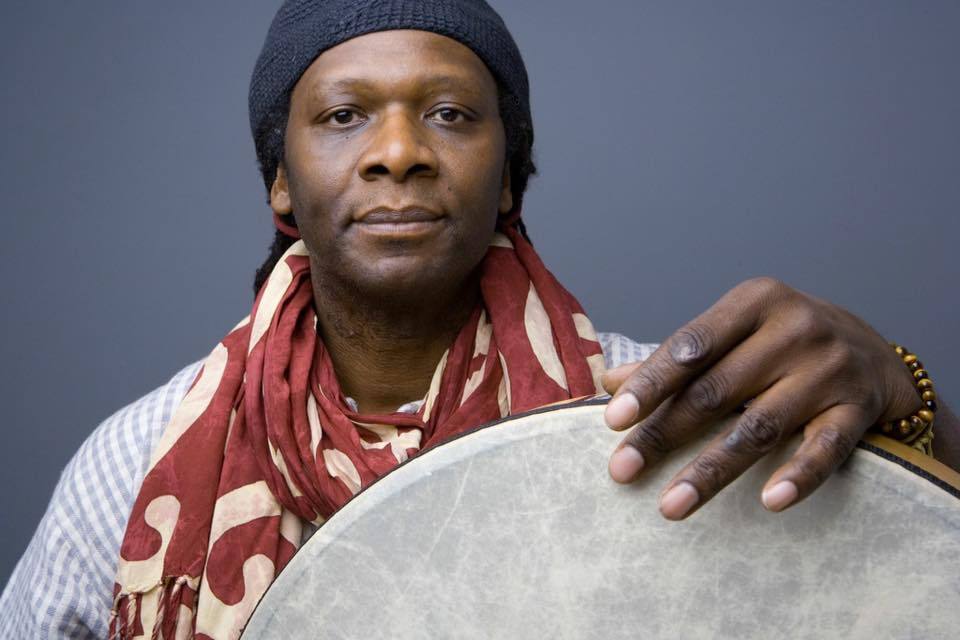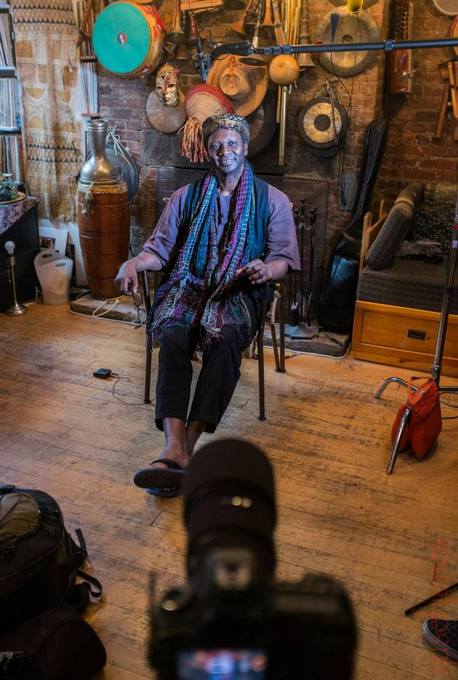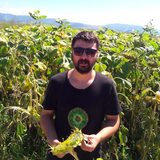What are you working on right now?
HD: Right now I am working on my first solo project. I’ve been waiting…I felt I needed to have something to say. A lot of people do solo projects and I think that’s good, but I’ve always felt that it wasn’t the right time for me; also I’ve been so busy with a lot of other projects too. I’ve been asked quite a few times to do solo recordings, but I always said
‘no, I’ll wait’. But now I feel it’s ok.
I’ve done a lot of solo concerts, but never put out a solo recording. I did a solo concert in Italy on June 12, it was a festival called
Terraforma, to brink more consciousness on our Mother Earth. I did a solo concert two years ago in Sardinia, one in Chicago, before coming, so I did a lot of solo concerts. I do that, but as far as putting out my own solo recording, and when I do that it will be not just drum set, but a lot of different percussive things too and probably some over dubbing also, with multiple things going on.
Do you try to begin a solo with an empty mind?
HD: Hahaha, to have an empty mind, that’s the hardest state to attempt to.
Did it ever happen?
HD: Yes, it happened.
Do you need to work yourself into that state?
HD: Well, I think it has to be spontaneous, because once, if you say you have an empty mind and you don’t have an empty mind, you only know later that you have an empty mind. Because if you say you have empty mind, you don’t have empty mind, because you’re already thinking about it.
There’s always a little bit of control there, and the idea is to get rid of that.
HD: Exactly. And it’s a spontaneous occurrence, you know? You can’t conceptualize your way to that place because conception itself means mental activity. A conception is a thought. So if you’re in that state, when you say you have empty mind, is gone. You only realize after that there was a moment where the mind was still. Because you can go back and realize that the mind was still. But you can’t say your mind is still and…and… being in a still mind… (
laughs). Because there are two things happening. I think anybody, at some point, experiences that empty state. It’s not something that is extraordinary or uncommon. But when you’re in it, you don’t know you’re in it. And it has to occur spontaneously; you can’t force it.
You can do things to help still the mind. I do a daily meditating practice, but before I play though, normally what happens to me is that I always get this feeling of - like - butterflies in the stomach. In the beginning it used to worry me, because I felt that other musicians never experienced that, and I was the only musician that was experiencing this feeling. Only because musicians usually never talk about it. But then, I found this book by a psychologist named
Rollo May, the book was called
’The Courage to Create’; because it does take a certain type of courage to create. And he talked about this thing…he said that it’s the body itself, in a biochemical way, preparing itself for the process of creativity. And anyone who does any creative endeavor normally experiences that. So now, when I don’t have that feeling before I play, that’s when I worry. I think it’s good never to feel too overly confident, because if you do, you don’t allow yourself to experience the possibility of happening something different or new. It’s good to keep a certain amount of humility and openness. For me it’s keeping a certain type of what I call a
‘’wonder-man in the universe’’. If I can maintain that, then my heart will have a possibility to remain open. The way I see it, this creative inspiration and potential really comes from the heart and if my heart is experiencing that, then I know there’s a possibility for me to be a vehicle or a vessel for others to experience that; from the heart.
For me, music right now is many things. One of the main things is a deep resonance of feeling. Of course, it goes along with intellectualism, conceptuality and all of that, but I think the main thing for me is the resonance of a feeling that comes from the heart.
Yes, we can feel that coming from you; hopefully, you can feel that too, coming from the public.
HD: Yes, I do. Because it’s a circle of energies. Essentially, this thing we call stage is an illusion.
Shall we get rid of the stage?
HD: Haha, well, at least of the concept of it. Often times we think that
‘ok, the musicians are doing something and they are affecting people out here.’ But I can see it from another perspective. I think there’s this energy, all this pervasive energy that’s happening. People - in what we call the audience - are experiencing it and those that we call musicians on the stage - they’re experiencing it. And we are creating it together, because it’s all pervasive, so they can’t be just musicians doing it. Musicians are affected by the audience just as much as audiences are affected by the musicians. The only problem is that often times musicians won’t allow themselves to admit to that fact.
Peter Brötzmann said pretty much the same thing. I think it was something regarding solos, because he also isn’t that type of musician that did solos, he’s always playing with other musicians.
HD: Yes, he talks a lot about that. That’s the reality, it is a circle of energies that’s happening and we assist and help each other.







